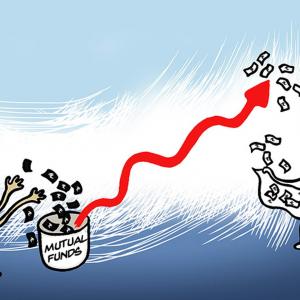If a 5% to 10% fall in the equity market gives you sleepless nights, you are not cut out for a 75% to 80% allocation to equities and must reduce it.

India's stock markets recently saw six consecutive loss-making sessions, and October ended up as the worst month for the BSE Sensex and National Stock Exchange Nifty this calendar year.
The advance-decline ratio for the entire market fell to 1.02 during the month, indicating gainers exceeded losers by a small margin of 42 stocks.
Within the narrower universe of Nifty 500, this ratio was even lower. After a smooth run, investors now need to prepare for a bout of volatility in the equity market.
High Volatility
Several factors are contributing to the current spell of volatility.
S Naren, executive director and chief investment officer, ICICI Prudential Asset Management Company, says: "Markets have lately been volatile due to worsening geopolitical tensions, rising yields on US 10-year bonds, persistent inflation, and high crude oil prices.
"If the geopolitical conflicts linger, global growth is likely to be impacted."
Stay Invested
Experts advise retail investors to continue with their allocation to equities, given the Indian market's strong prospects.
Naren adds: "India has one of the best structural stories in the world. The Indian economy is poised for growth, with a number of structural reforms in progress and strong fundamentals.
"Favourable demographics and demand are encouraging for the economy."
Naren further says a sharp decrease in corporate debt over the past years has paved the way for an investment cycle to begin.
Impaired loans are declining, suggesting stability within the banking sector.
He believes investors may end up with a good investment experience if they stay invested for the long term.
Get Accustomed To Volatility
Experts say volatility is an inherent part of equity markets. The sooner investors learn to accept it, the better they are likely to fare in the markets.
Deepesh Raghaw, a Sebi-registered investment advisor, says: "Some or the other negative development keeps coming, and the market reacts.
"In 2013, we had the taper tantrum.
"In 2016 there was demonetisation.
"In 2018-2019, mid and smallcap stocks saw a sharp drawdown.
"In March 2020 the markets fell due to the onset of Covid.
"In February 2022, the Russia-Ukraine war broke out.
"In 2022, there was global inflation which resulted in the US Fed and other central banks raising interest rates. Long-term investors need to learn to take such developments in their stride."
Investors should only put that money into equities which they will not need for the next 7-10 years.
Plutus Capital investment advisor Ankur Kapur says: "When you invest in a house, which is also a growth asset, you cannot check its valuation every day because none is available. You hold it for 10 years or so and usually end up with an inflation-beating return."
"Adopt a similar approach in equities," says Kapur. In other words, don't allow yourself to be perturbed by interim volatility.
Diversify Your Portfolio
Make sure that your investment portfolio is diversified across asset classes like equities, fixed income, gold and real estate. Such a portfolio will be impacted less by an equity market downturn than a pure equity portfolio.
Fix Your Asset Allocation
Many investors begin their investment journey with a 100 per cent allocation to equity funds. This is not a viable investment strategy.
For their portfolios to survive downturns, they need to follow a proper asset allocation strategy.
"The right asset allocation is one that you can live with -- which allows you to sleep peacefully at night," says Raghaw.
If, for instance, a 5 to 10 per cent fall in the equity market gives you sleepless nights, you are not cut out for a 75 to 80 per cent allocation to equities and must reduce it.
Begin with a 50:50 allocation to equities and debt and figure out over time the allocation that is best suited for you.
Kapur says: "If you are young, have a long investment horizon, and a reasonably high tolerance for volatility, you can go for a 75:25 allocation.
"If not, stick to a 50:50 allocation, or go with an even lower equity exposure."
Check Sub-Asset Allocation
Currently, many experts are advising investors to tilt their portfolios towards largecap stocks.
Kapur says: "The risk-reward ratio is currently in favour of largecap stocks. However, such a decision involving market timing is more relevant for direct stock investors, not mutual fund investors."
For mutual fund investors, sticking to their sub-asset allocation would suffice.
Retail money tends to chase performance. Owing to their strong performance in the recent past, many portfolios are heavily exposed to smallcap funds, which could pose a big problem if this segment sees a downturn.
Let's assume an investor has a 60:40 exposure to equity and debt, and within equities she has a 50 per cent exposure to largecap funds and 50 per cent to mid and smallcap funds.
Raghaw says: "If after the recent rally, your exposure to mid and smallcap funds has increased beyond your original allocation, and you believe that a downturn in the equity markets could cause this segment to suffer more, then you should reduce your exposure to it and bring it back to the original level."
According to him, by following such a rule-based approach and automating investments by starting systematic investment plans (SIPs) -- thereby avoiding the dilemma of whether the market is too expensive or too cheap -- investors can do well over the long term.
Lump-sum investments in the mid and smallcap segment should be avoided currently.
Consider Hybrid Funds
Investors who can build and maintain a diversified portfolio of the kind described above, and rebalance it periodically, may continue with that approach.
Those who cannot do so may consider a hybrid fund. Naren suggests investing in a multi-asset fund.
"Such a fund allows an investor exposure to three or more asset classes within a single fund.
"Hence, if one asset class turns volatile, the overall impact on the portfolio is limited by the presence of multiple other asset classes which may perform well," he says.
Raghaw suggests investing in a dynamic asset allocation/balanced advantage fund with a sound long-term track record.
What Should Direct Investors Do?
A large number of retail investors have entered the equity markets in recent months and are investing directly in stocks.
Many of them are heavily invested in smallcap stocks. Their performance over the past few months may have caused them to mistake luck for skill.
If you invest in stocks based on tips and lack the ability to do research on a stock, avoid direct investing.
You also need to check whether you have the emotional resilience to invest directly.
If a Rs 1 lakh investment comes down to Rs 60,000, then, rather than staying invested and hoping that the stock will move up again, you should consider whether it is indeed a qualitatively good stock.
Due to the behavioural bias called loss aversion, most retail investors may find it difficult to take such hard decisions.
"When the markets fall, poor quality stocks tend to fall more. Not only do quality stocks fall less, but they also recover faster," says Kapur.
Investors should also be wary about liquidity risk in smallcap stocks.
Jatin Khemani, managing partner and chief investment officer of New Delhi-based Sebi-registered portfolio management services firm Stalwart Investment Advisors, says: "Be cautious with illiquid stocks, especially in the SME (small and medium enterprises) and microcap segments.
"In good markets, it is easy to enter them amid strong momentum, but it becomes difficult to exit in a bad market."
In recent times, order-book-driven, EPC (engineering, procurement and construction), and PSU (public sector undertaking) businesses have done exceptionally well.
"But as seen in past cycles, this may not translate into earnings and cash flows in many cases. Valuations have risen amid the current hype and may not sustain once the reality becomes clear over the next couple of years," says Khemani.
He suggests investors who have a heavy allocation to such businesses start pruning their exposure.
"In cyclical businesses, if profits are not booked on the way up, things revert to where they started or even go negative," he adds, suggesting rotating the portfolio to businesses that are more predictable and reasonably valued.

Disclaimer: This article is meant for information purposes only. This article and information do not constitute a distribution, an endorsement, an investment advice, an offer to buy or sell or the solicitation of an offer to buy or sell any securities/schemes or any other financial products/investment products mentioned in this article to influence the opinion or behaviour of the investors/recipients.
Any use of the information/any investment and investment related decisions of the investors/recipients are at their sole discretion and risk. Any advice herein is made on a general basis and does not take into account the specific investment objectives of the specific person or group of persons. Opinions expressed herein are subject to change without notice.
Feature Presentation: Ashish Narsale/Rediff.com










